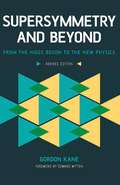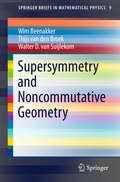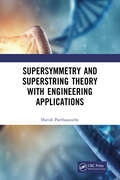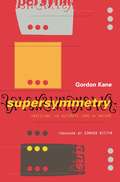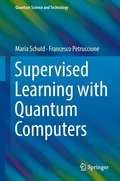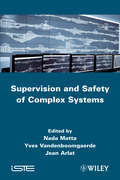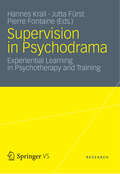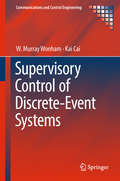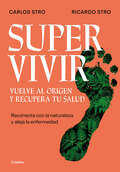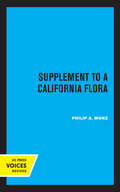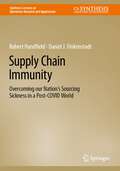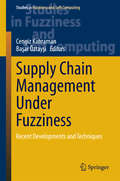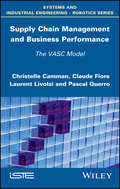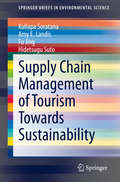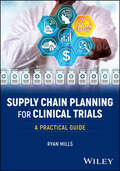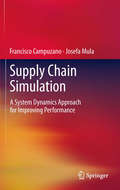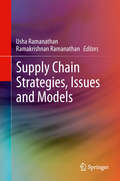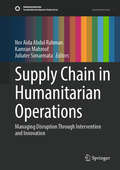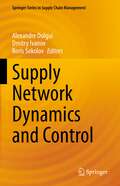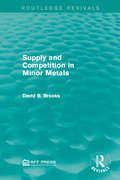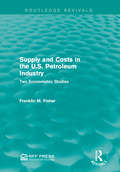- Table View
- List View
Supersymmetry and Beyond: From the Higgs Boson to the New Physics
by Gordon KaneThe epic story of the quest to uncover a fully unified theory of physics, revised to reflect the possible discovery of the Higgs Boson.
Supersymmetry and Noncommutative Geometry
by Wim Beenakker Thijs van den Broek Walter D. van SuijlekomIn this work the question whether noncommutative geometry allows for supersymmetric theories is addressed. Noncommutative geometry has seen remarkable applications in high energy physics, viz. the geometrical interpretation of the Standard Model, however such a question has not been answered in a conclusive way so far. The book starts with a systematic analysis of the possibilities for so-called almost-commutative geometries on a 4-dimensional, flat background to exhibit not only a particle content that is eligible for supersymmetry, but also have a supersymmetric action. An approach is proposed in which the basic `building blocks' of potentially supersymmetric theories and the demands for their action to be supersymmetric are identified. It is then described how a novel kind of soft supersymmetry breaking Lagrangian arises naturally from the spectral action. Finally, the above formalism is applied to explore the existence of a noncommutative version of the minimal supersymmetric Standard Model. This book is intended for mathematical/theoretical physicists with an interest in the applications of noncommutative geometry to supersymmetric field theories.
Supersymmetry and String Theory, Second Edition: Beyond the Standard Model
by Michael DineThe past decade has witnessed dramatic developments in the fields of experimental and theoretical particle physics and cosmology. <P><P>This fully updated second edition is a comprehensive introduction to these recent developments and brings this self-contained textbook right up to date. Brand new material for this edition includes the groundbreaking Higgs discovery, results of the WMAP and Planck experiments. Extensive discussion of theories of dynamical electroweak symmetry breaking and a new chapter on the landscape, as well as a completely rewritten coda on future directions gives readers a modern perspective on this developing field. A focus on three principle areas: supersymmetry, string theory, and astrophysics and cosmology provide the structure for this book which will be of great interest to graduates and researchers in the fields of particle theory, string theory, astrophysics and cosmology.
Supersymmetry and Superstring Theory with Engineering Applications
by Harish ParthasarathyThis book introduces the vast subject of supersymmetry along with many specific examples of engineering applications, for example: • The design of quantum unitary gates using supersymmetric actions.• Bosonic and Fermionic noise in quantum systems using the Hudson-Parthasarathy quantum stochastic calculus.• Superstring theory applied to the quantum mechanics of neurons and supersymmetric quantum filtering theory which can, for example, be used to filter out the noise in a cavity resonator electromagnetic field produced by the presence electrons and positrons in a bath surrounding it.• Simplified versions of super-Yang-Mills theory with gauge and gaugino fields, both transforming under the adjoint representation of the gauge group and elementary super-gravity models have also been introduced. All through the book, emphasis is laid upon exploiting the supersymmetry existing in the nature of Boson-Fermion exchange in designing engineering systems like quantum computers and analyzing the performance of systems in the presence of supersymmetric quantum noise.
Supersymmetry, Supergravity, and Unification
by Pran NathThis unique book gives a modern account of particle physics and gravity based on supersymmetry and supergravity, two of the most significant developments in theoretical physics since general relativity. The book begins with a brief overview of the history of unification and then goes into a detailed exposition of both fundamental and phenomenological topics. The topics in fundamental physics include Einstein gravity, Yang-Mills theory, anomalies, the standard model, supersymmetry and supergravity, and the construction of supergravity couplings with matter and gauge fields, as well as computational techniques for SO(10) couplings. The topics of phenomenological interest include implications of supergravity models at colliders, CP violation, and proton stability, as well as topics in cosmology such as inflation, leptogenesis, baryogenesis, and dark matter. The book is intended for graduate students and researchers seeking to master the techniques for building grand unified models.
Supersymmetry: Squarks, Photinos, and the Unveiling of the Ultimate Laws of Nature
by Gordon KaneFor most of human history, man has been trying to discover just how the universe works. In this groundbreaking work, renowned physicist Gordon Kane first gives us the basics of the Standard Model, which describes the fundamental constituents and forces of nature. He then explains the next great leap in understanding: the theory of supersymmetry, which implies that each of the fundamental particles has a "superpartner" that can be detected at energies and intensities only now being achieved in the giant accelerators. If Kane and his colleagues are correct, these superpartners will also help solve many of the puzzles of modern physics-such as the existence of the Higgs boson-as well as one of the biggest mysteries is cosmology: the notorious "dark matter" of the universe.
Supersymmetry: Squarks, Photinos, and the Unveiling of the Ultimate Laws of Nature
by Gordon Kane"A fascinating account of the theoretical ideas behind supersymmetry. . . told by someone who has contributed deeply to the development of the field. " -NatureFor most of human history, man has been trying to discover just how the universe works. In this groundbreaking work, renowned physicist Gordon Kane first gives us the basics of the Standard Model, which describes the fundamental constituents and forces of nature. He then explains the next great leap in understanding: the theory of supersymmetry, which implies that each of the fundamental particles has a "superpartner" that can be detected at energies and intensities only now being achieved in the giant accelerators. If Kane and his colleagues are correct, these superpartners will also help solve many of the puzzles of modern physics-such as the existence of the Higgs boson-as well as one of the biggest mysteries is cosmology: the notorious "dark matter" of the universe.
Supervised Learning with Quantum Computers (Quantum Science and Technology)
by Maria Schuld Francesco PetruccioneQuantum machine learning investigates how quantum computers can be used for data-driven prediction and decision making. The books summarises and conceptualises ideas of this relatively young discipline for an audience of computer scientists and physicists from a graduate level upwards. It aims at providing a starting point for those new to the field, showcasing a toy example of a quantum machine learning algorithm and providing a detailed introduction of the two parent disciplines. For more advanced readers, the book discusses topics such as data encoding into quantum states, quantum algorithms and routines for inference and optimisation, as well as the construction and analysis of genuine ``quantum learning models''. A special focus lies on supervised learning, and applications for near-term quantum devices.
Supervision and Safety of Complex Systems
by Jean Arlat Yves Vandenboomgaerde Nada MattaThis book presents results of projects carried out by both scientific and industry researchers into the techniques to help in maintenance, control, supervision and security of systems, taking into account the technical environmental and human factors.This work is supported by the Scientific Group GIS 3SGS. It is a collaborative work from 13 partners (academic and industrial) who have come together to deal with security problems. The problems and techniques discussed mainly focus on stochastic and dynamic modeling, maintenance, forecasting, diagnosis, reliability, performance, organizational, human and environmental factors, uncertainty and experience feedback.
Supervision in Psychodrama
by Pierre Fontaine Hannes Krall Jutta FürstSupervision plays an essential role in the process of learning and professional development in psychotherapy and training. High quality in supervision is a crucial part of the training to support and to guide trainees and to be a reliable point of reference in terms of practice and theory, technical and methodological standards, ethical issues, research and evaluation. Therefore, the main purpose of this book is to share ways of doing supervision in psychodrama among supervisors and trainers in different countries and to stimulate further discussion and development.
Supervisory Control of Discrete-Event Systems (Communications and Control Engineering)
by Kai Cai W. Murray WonhamThis book shows how supervisory control theory (SCT) supports the formulation of various control problems of standard types, like the synthesis of controlled dynamic invariants by state feedback, and the resolution of such problems in terms of naturally definable control-theoretic concepts and properties, like reachability, controllability and observability. It exploits a simple, abstract model of controlled discrete-event systems (DES) that has proved to be tractable, appealing to control specialists, and expressive of a range of control-theoretic ideas. It allows readers to choose between automaton-based and dually language-based forms of SCT, depending on whether their preference is for an internal-structural or external-behavioral description of the problem. The monograph begins with two chapters on algebraic and linguistic preliminaries and the fundamental concepts and results of SCT are introduced. To handle complexity caused by system scale, architectural approaches—the horizontal modularity of decentralized and distributed supervision and the vertical modularity of hierarchical supervision—are introduced. Supervisory control under partial observation and state-based supervisory control are also addressed; in the latter, a vector DES model that exploits internal regularity of algebraic structure is proposed. Finally SCT is generalized to deal with timed DES by incorporating temporal features in addition to logical ones. Researchers and graduate students working with the control of discrete-event systems or who are interested in the development of supervisory control methods will find this book an invaluable aid in their studies. The text will also be of assistance to researchers in manufacturing, logistics, communications and transportation, areas which provide plentiful examples of the class of systems being discussed.
Supervisory Control of Discrete-Event Systems (Communications and Control Engineering)
by Kai Cai W. Murray WonhamThis book shows how supervisory control theory (SCT) supports the formulation of various control problems of standard types, like the synthesis of controlled dynamic invariants by state feedback, and the resolution of such problems in terms of naturally definable control-theoretic concepts and properties, like reachability, controllability and observability. It exploits a simple, abstract model of controlled discrete-event systems (DES) that has proved to be tractable, appealing to control specialists, and expressive of a range of control-theoretic ideas. It allows readers to choose between automaton-based and dually language-based forms of SCT, depending on whether their preference is for an internal-structural or external-behavioral description of the problem. The monograph begins with two chapters on algebraic and linguistic preliminaries and the fundamental concepts and results of SCT are introduced. To handle complexity caused by system scale, architectural approaches—the horizontal modularity of decentralized and distributed supervision and the vertical modularity of hierarchical supervision—are introduced. Supervisory control under partial observation and state-based supervisory control are also addressed; in the latter, a vector DES model that exploits internal regularity of algebraic structure is proposed. Finally SCT is generalized to deal with timed DES by incorporating temporal features in addition to logical ones. Researchers and graduate students working with the control of discrete-event systems or who are interested in the development of supervisory control methods will find this book an invaluable aid in their studies. The text will also be of assistance to researchers in manufacturing, logistics, communications and transportation, areas which provide plentiful examples of the class of systems being discussed.
Supervivir. Vuelve al origen y recupera tu salud: Reconecta con la naturaleza y aleja la enfermedad
by Carlos Stro Ricardo StroEl ser humano antiguo sobrevivía. El ser humano moderno subsiste. A nuestro alcance tenemos la capacidad de supervivir. Aquí te mostraremos cómo. Las especies vivas llevan poblando la Tierra unos 3.500 millones de años. Durante todo este tiempo, astronómicamente imposible de comprender por la mente humana, la vida siempre estuvo conectada a la naturaleza. Nunca fue necesario explicarle a ningún ser vivo qué comer o cuántas veces al día hacerlo ni el tiempo que puede exponerse al sol. Esto ha cambiado en apenas 150 años. Existe una raza a la que ahora es necesario enseñarle a nutrirse: la nuestra. El gran cerebro que poseemos nos ha permitido romper con las reglas de nuestro diseño por primera vez en la historia y hemos incorporado tantas variables nuevas debido al imparable avance de la tecnología que ya no sabemos cuáles son las que nos enferman, nos sanan o nos dejan igual. Te invitamos a abrir tu mente, destruir los dogmas y abrazar una nueva realidad donde la naturaleza vuelva a abrirse paso y ocupe el sitio que nunca debió perder.
Supplement to A California Flora
by Philip A. MunzThis title is part of UC Press's Voices Revived program, which commemorates University of California Press’s mission to seek out and cultivate the brightest minds and give them voice, reach, and impact. Drawing on a backlist dating to 1893, Voices Revived makes high-quality, peer-reviewed scholarship accessible once again using print-on-demand technology. This title was originally published in 1968.
Supply Chain Immunity: Overcoming our Nation’s Sourcing Sickness in a Post-COVID World (Synthesis Lectures on Operations Research and Applications)
by Robert Handfield Daniel J. FinkenstadtThis book provides a concerted supply chain perspective for dealing with pandemics on the scale of COVID-19. Specifically, this book describes a new approach, supply chain immunity, to illustrate what is needed to fix our economy and healthcare systems. The authors of this book are experts in supply chain management, health care supply chains, major systems acquisition, and contingency sourcing methods. Based on first-hand experiences working during COVID in the depths of the nation’s supply chain failures, the authors develop important themes for private and public sector supply chain managers to consider in rebuilding a more immune supply chain. The book is targeted at policy makers, academics, practitioners, and students of disaster response, public policy, healthcare, and supply chain management who are interested in learning contemporary lessons from the COVID-19 pandemic. From the perspective of those who lived through the chaos, the authors further explore the application of novel concepts in joint planning, market intelligence, and governance related to a national pandemic or other global contingency.
Supply Chain Management Under Fuzziness
by Cengiz Kahraman Başar ÖztayşiSupply Chain Management Under Fuzziness presents recently developed fuzzy models and techniques for supply chain management. These include: fuzzy PROMETHEE, fuzzy AHP, fuzzy ANP, fuzzy VIKOR, fuzzy DEMATEL, fuzzy clustering, fuzzy linear programming, and fuzzy inference systems. The book covers both practical applications and new developments concerning these methods. This book offers an excellent resource for researchers and practitioners in supply chain management and logistics, and will provide them with new suggestions and directions for future research. Moreover, it will support graduate students in their university courses, such as specialized courses on supply chains and logistics, as well as related courses in the fields of industrial engineering, engineering management and business administration.
Supply Chain Management and Business Performance: The VASC Model
by Christelle Camman Claude Fiore Laurent Livolsi Pascal QuerroAgainst this current trend of low growth and high uncertainty, business directors must work with their shareholders to set strategic objectives and define business models. The great number of possible strategies makes this type of management very complex, and the actual deployment of strategic choices is often limited by a lack of overall coherence within the organization. This problem calls for an appropriate and renewed response. In strategic management today, a closer, permanent dialogue is needed between operational and financial performance. Based on a supply chain approach, the Value Added Supply Chain (VASC) model focuses on driving operational performance, but aims to achieve a greater and more dynamic integration between these two dimensions of the company's value creation.
Supply Chain Management of Tourism Towards Sustainability (SpringerBriefs in Environmental Science)
by Kullapa Soratana Amy E. Landis Fu Jing Hidetsugu SutoThis book discusses applied life cycle and supply chain management approaches for the sustainable development of tourism in Asian countries. The book describes the current state of the tourism industry in Asia from a perspective of sustainability, and analyzes the trade-offs between the three pillars of sustainability (environment, society, economy) as they pertain to the implementation of sustainable tourism. In 5 chapters, this book offers guidance for students, researchers and corporations interested in applying sustainability in tourism related activities.Chapter 1 introduces readers to the life cycle and supply chain approaches to driving sustainable development in tourism, and discusses the need for these strategies in the face of current issues with the tourism industry in Asia. Chapter 2 provides more details on the role of life cycle approaches in the sustainable development of tourism, including proper practices and implications. Chapter 3 presents how knowledge and best practices among stakeholders in the tourism sector can be shared. Chapter 4 discusses how promoting sustainable tourism can improve tourists' experience, and chapter 5 concludes the book by addressing how life cycle and supply chain approaches can be used together for tourism enterprises.
Supply Chain Planning for Clinical Trials: A Practical Guide
by Ryan MillsEnsure your clinical trial supply chain is running smoothly with this practical guide Clinical trials are a critical part of the pharmaceutical development process. These trials cannot proceed without timely and regular receipt of the drugs being tested, which can prove a challenge for drug manufacturers who have not yet established the structures required to produce quality-controlled specimens of the drug at scale. Managing supply chains of pre-production drugs for clinical trials is therefore an essential component of drug development. Supply Chain Planning for Clinical Trials offers a practical introduction to this process for researchers and industry professionals. Beginning with the basics of clinical trial supply chain management, it proceeds step by step through all aspects of demand and supply planning for clinical trials. The result is a thorough overview that also offers practical examples of how to plan supply for clinical trials. Supply Chain Planning for Clinical Trials readers will also find: Tools for minimizing risk and expense by optimizing the relationship between supply and demand Detailed discussion of topics including quality and regulatory considerations and the business processes that support clinical trial supply chain management Spreadsheet-based models to illustrate key concepts, adaptable to the readers’ specific scenarios Supply Chain Planning for Clinical Trails is ideal for pharmaceutical industry professionals involved in clinical trial supply planning, as well as academics and researchers interested in the pharmaceutical industry and its logistics.
Supply Chain Simulation
by Francisco Campuzano Josefa MulaSupply Chain Simulation allows readers to practice modeling and simulating a multi-level supply chain. The chapters are a combination of the practical and the theoretical, covering: knowledge of simulation methods and techniques,the conceptual framework of a typical supply chain,the main concepts of system dynamics, anda set of practice problems with their corresponding solutions.The problem set includes illustrations and graphs relating to the simulation results of the Vensim® program, the main code of which is also provided. The examples used are a valuable simulation tool that can be modified and extended according to user requirements. The objective of Supply Chain Simulation is to meet the demands of supply chain simulation or similar courses taught at the postgraduate level. The "what if" analysis recreates different simulation scenarios to improve the decision-making process in terms of supply chain performance, making the book useful not only for postgraduate students, but also for industrial practitioners.
Supply Chain Strategies, Issues and Models
by Usha Ramanathan Ramakrishnan RamanathanIn the 21st century, supply chain operations and relationships among supply chain partners have become highly challenging, necessitating new approaches, e. g. , the development of new models. Supply Chain Strategies, Issues and Models discusses supply chain issues and models with examples from actual industrial cases. Expert authors with a wide spectrum of knowledge working in various areas of supply chain management from various geographical locations offer refreshing, novel and insightful ideas and address possible solutions using established theories and models. Supply Chain Strategies, Issues and Models features studies that have used mathematical modeling, statistical analyses and also descriptive qualitative studies. The chapters cover many relevant themes related to supply chains and logistics including supply chain complexity, information sharing, quality (six sigma), electronic Kanbans, inventory models, scheduling, purchasing and contracts. To facilitate easy reading, the chapters that deal with supply chain related issues are first, followed by studies on inventory, scheduling, purchasing and logistics. This book can be used as a useful resource of supply chain management by academics, students and practitioners. This book can serve as a helping tool in managerial decision making for investments in collaboration and information exchange to improve forecasts, scheduling and inventory management, and for supply chain managers to leverage product and process complexities into competitive advantage. Some interesting mathematical models can appeal to students and researchers interested in modeling the impact of information sharing in supply chains.
Supply Chain in Humanitarian Operations: Managing Disruption Through Intervention and Innovation (Sustainable Development Goals Series)
by Nor Aida Abdul Rahman Kamran Mahroof Juliater SimarmataThis book explores the pivotal role of humanitarian logistics and supply chain management in ensuring effective response and relief efforts during crises. It delves into the technology revolution in this field, covering emerging trends and providing in-depth knowledge on theories and applications. The book emphasizes how technology can enhance the efficiency of humanitarian logistics and supply chain operations, integrating and optimizing technology for effective aid delivery during emergencies or crises. This book highlights the vital role that humanitarian logistics and supply chain management play during crises, emphasizing recent technological advancements. It explores the key components, challenges, and innovations that enhance the effectiveness of these systems in providing timely and targeted assistance. The book also connects humanitarian logistics to several Sustainable Development Goals (SDGs), demonstrating how these efforts contribute to poverty alleviation, health, and disaster resilience. This book offers a blend of comprehensive research and high-quality outputs from reputed authors and editors. It targets doctoral, postgraduate, graduate, and final-year undergraduate students in aviation, logistics, transport, travel, and tourism studies, as well as managers and decision-makers worldwide.
Supply Network Dynamics and Control (Springer Series in Supply Chain Management #20)
by Dmitry Ivanov Alexandre Dolgui Boris SokolovThis book provides a comprehensive overview of recent developments in network dynamics and control with applications to supply chains, manufacturing and logistics systems. It systemizes these developments in the form of new taxonomies and methodological principles to shape the research domain of supply network dynamics control. Uniquely, the book links the fundamentals of control and system theories and artificial intelligence with supply chain and operations management. It addresses the needs of researchers and practitioners alike, revealing the challenges and opportunities of supply chain and operations management by means of dynamic system analysis.
Supply and Competition in Minor Metals (Routledge Revivals)
by David B. BrooksAn interest in the minor metals – termed "minor" as their annual production is relatively small – had been developing for many years. This study, first published in 1965, examines patterns of supply that can be identified as underlying the production of minor metals, and then uses these patterns to investigate the nature and degree of competition in the production of minor metals. This book will be of interest to students of environmental studies.
Supply and Costs in the U.S. Petroleum Industry: Two Econometric Studies (Routledge Revivals)
by Franklin M. FisherAny discussion of the various facets of petroleum policy in the United States rests to a greater or less extent on the issue of sensitivity of petroleum exploration, and hence of new petroleum discoveries to economic incentives. Indeed, a principle argument in favour of having a special petroleum policy at all is that domestic petroleum exploration is so sensitive to economic considerations that in the absence of special incentives exploration expenditures would sharply decrease, as would the amount of petroleum discovered; consequently, the nation’s known oil resources would be reduced to an extent dangerous in the event of an international crisis. This study attempts to answer the question: how sensitive are new petroleum discoveries to economic incentives? This book will be of interest to students of environmental studies.
